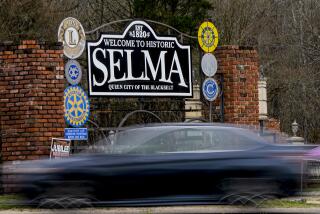President Urges Extension of the Voting Rights Act
- Share via
WASHINGTON — President Bush paid tribute Monday to the civil rights legacies of the Rev. Martin Luther King Jr. and Rosa Parks, using the federal holiday celebrating King’s birthday to renew his support for the extension of the Voting Rights Act.
“We all must recognize we have more to do,” Bush told an audience of about 2,500 at the John F. Kennedy Center for the Performing Arts.
Key provisions of the landmark legislation expire next year, and civil rights groups have expressed concern that conservatives might try to modify some of its central elements -- one requiring nine states, most of them in the South, to gain the federal government’s approval before modifying voting regulations, and another requiring election officials to offer voting information in the languages of immigrants who may not be fluent in English.
“Congress must renew the Voting Rights Act of 1965,” Bush said. He offered no specifics.
In brief remarks during an hourlong program of speeches and music, Bush praised King, who was assassinated at age 39 in 1968, and Parks, who died last year at 92. Her refusal in 1955 to yield her seat on a Montgomery, Ala., bus to a white passenger sparked a boycott, led by King, of the city transit system that resulted in a 1956 Supreme Court decision banning segregation in public transportation.
Earlier in the day, the president traveled to the National Archives building, a few minutes’ drive from the White House, to view the Emancipation Proclamation, which President Lincoln issued Jan. 1, 1863, during the Civil War. The document, which is rarely on public display, declared the freedom of slaves held in the states that had seceded from the Union.
Accompanied by Allen Weinstein, the archivist of the United States, Bush put on reading glasses to look at the faded handwriting, leaned over the case and moved along the five-page display for about 30 seconds.
“Abraham Lincoln recognized that all men are created equal. Martin Luther King lived on that admonition to call our country to a higher calling, and today we celebrate the life of an American who called Americans to account when we didn’t live up to our ideals,” Bush said.
During the Kennedy Center program, sponsored by Georgetown University, Bush said that King and Parks “strongly believed that segregation could not stand once it was held up to the light in all its ugliness.”
“They roused a dozing conscience of a complacent nation,” he said. “At the dawn of this new century, America can be proud of the progress we have made toward equality, but we all must recognize we have more to do.”
Bush has had uneasy political relations with African Americans, courting them through churches and faith-based organizations while meeting only on the rarest occasions with such political organizations as the Congressional Black Caucus.
Nevertheless, the White House has been conducting a high-profile campaign, led by Republican Party Chairman Ken Mehlman, to woo black voters. But those efforts were sidetracked last year by the federal government’s response to Hurricane Katrina, which took a particularly heavy toll on blacks in New Orleans.
Black ministers who had affiliated themselves with Bush during his first term expressed dismay at the government’s hurricane recovery effort.
The initiative to seek black support has been built on an appeal to the conservative culture often found in African American churches, particularly opposition to abortion, as Republicans seek to cut into the Democrats’ longtime support among minorities. Before the hurricane, the efforts started during Bush’s first term had begun to pay off.
In the 2004 election, the president increased his share of the black vote by as much as 7% in key states. The White House had distributed millions of dollars in government funds to black churches and other faith-based social services at the center of the outreach effort to demonstrate common ground among African Americans and the administration.
Mehlman has made repeated trips to different parts of the country, visiting conventions of black organizations and meeting with black leaders.
In July, he spoke to the NAACP annual convention in Milwaukee -- a group Bush has not addressed in five years as president -- and denounced his party’s racially divisive Southern strategy of the late 1960s, under which Richard Nixon used such issues as desegregation and forced busing of schoolchildren to gain the support of white voters in his successful 1968 presidential campaign.
More to Read
Sign up for Essential California
The most important California stories and recommendations in your inbox every morning.
You may occasionally receive promotional content from the Los Angeles Times.













